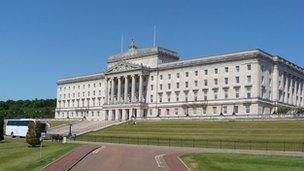Northern Ireland's education year
- Published

Northern Ireland education gained a new Stormont minister this year, following Assembly elections in May.
It was widely speculated that Sinn Fein would be replaced as the holder of the post, made controversial by that party's anti-academic selection stance.
Perhaps one of the political parties which had so opposed Sinn Fein might grab the role for itself, but no, Sinn Fein decided to continue the job it had started.
The only change was the person in control. Gone was Caitrona Ruane whose personality appeared to ruffle feathers.
Instead, John O'Dowd stepped into the post, acclimatised after months of acting as the party spokesman on education. His policies would remain the same but there was hope that his personality would allow bridges to be built and progress to be made on controversial issues.
Eight months later there was a breakthrough with cross-party agreement that the Education and Skills Authority should be created. The fine detail has still to be worked out, but after six years of delay and disagreement, it is likely to be voted on in July 2012 and finally start to operate in 2013.
What an achievement for devolved government, but some would say that, since no-one disagreed with the idea of a combined education authority to replace a raft of others, that has taken a very long time.
Entrance exams
One issue which has not won cross-party, or even cross-school agreement is the grammar schools' continued use of academic selection. For the third year, they have conducted their own entrance exams, in defiance of the education minister who has no power to ban them.
The shortage of money has been a topic of worry, although schools have been accused of hiding their heads in the sand, not realising that very hard times are ahead. School building projects are almost at a standstill, partly because of budget problems, but also because the education minister wants an audit carried out to see which schools deserve new buildings and which areas should reassess their needs to avoid duplication.
The money paid for each pupil in a school is going to fall. Principals had been expecting a 3% drop in funding, but were shocked to discover the figure will be 5%. There are predictions that no school will manage to avoid at least one teacher redundancy and, overall there will be hundreds, if not thousands over the next few years.
University fees
Tuition fees for undergraduates kept parents, students and the universities guessing for months. Will they or won't they rise to the new expensive level of England?
In the end, £9,000 a year was considered too much of a deterrent for Northern Ireland's students. The Department of Employment and Learning did a deal with the Assembly Executive to peg fees at current rates, plus inflation.
So, in keeping with Wales and Scotland, local students who study in their home country will get a better deal than residents of England.
However, the bad news for Northern Ireland students is if they go to university elsewhere in the UK, they will pay the full, higher fee, not subsidised by the Northern Ireland Assembly. Students coming to Northern Ireland from Great Britain will pay higher fees than local people.
Belt tightening is ahead for education sectors of all kinds, so past complaints about a shortage of funds could soon pale into insignificance in the new climate of recession.
- Published27 December 2011
- Published27 December 2011
- Published28 December 2011
- Published9 September 2011
- Published26 September 2011
- Published7 April 2011